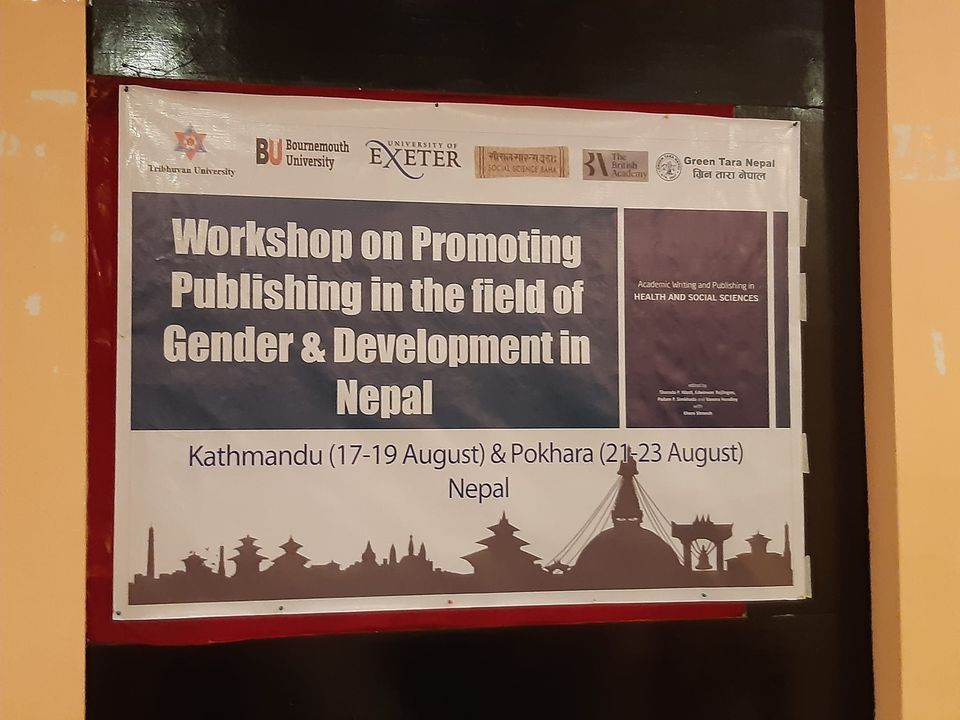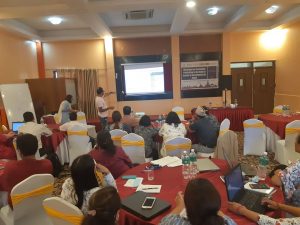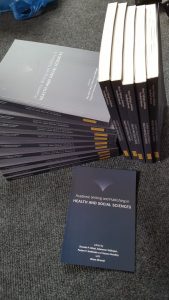 Today was the second day of our three-day Writing Workshop organised in Kathmandu Nepal. The project builds research capacity of early career researchers researching gender in Nepal-based higher education institutions by improving their chances of getting published in international journals in English. The workshops is delivered by a team of UK-based academic led by BU’s Dr. Shovita Dhakal Adhikari. The team further includes BU’s Dr. Pramod Regmi and Prof. Edwin van Teijlingen, Dr. Emma Pitchforth from the University of Exeter, and Dr. Rashmee Rajkarnikar from Nepal’s oldest university, Tribhuvan University. The workshop is run for a maximum of 30 participants over a three-day period. Tomorrow will be last day in Kathmandu, before we travel to Pokhara and repeat the three-day workshop there starting on Sunday.
Today was the second day of our three-day Writing Workshop organised in Kathmandu Nepal. The project builds research capacity of early career researchers researching gender in Nepal-based higher education institutions by improving their chances of getting published in international journals in English. The workshops is delivered by a team of UK-based academic led by BU’s Dr. Shovita Dhakal Adhikari. The team further includes BU’s Dr. Pramod Regmi and Prof. Edwin van Teijlingen, Dr. Emma Pitchforth from the University of Exeter, and Dr. Rashmee Rajkarnikar from Nepal’s oldest university, Tribhuvan University. The workshop is run for a maximum of 30 participants over a three-day period. Tomorrow will be last day in Kathmandu, before we travel to Pokhara and repeat the three-day workshop there starting on Sunday.
 Over the years our Bournemouth University team has build up capacity in academic writing and publishing in Nepal on a more ad hoc basis . This grant will allow us to offer a more systematic approach to academic writing capacity building in Nepal. It is building on a growing number of paper published by Faculty of Health & Social Sciences staff on various aspects of academic writing and publishing. [1-20]
Over the years our Bournemouth University team has build up capacity in academic writing and publishing in Nepal on a more ad hoc basis . This grant will allow us to offer a more systematic approach to academic writing capacity building in Nepal. It is building on a growing number of paper published by Faculty of Health & Social Sciences staff on various aspects of academic writing and publishing. [1-20]  The project is funded by the British Academy and supported by the charity Green Tara Nepal and Social Science Baha.
The project is funded by the British Academy and supported by the charity Green Tara Nepal and Social Science Baha.
References:
- Harvey, O., Taylor, A., Regmi, P.R., van Teijlingen, E. (2022) Struggling to reply to reviewers: Some advice for novice researchers. Health Prospect, 21(2):19-22.
- Arnold, R., Ireland, J., Mahato, P., van Teijlingen, E. (2022) Writing and publishing a reflective paper: Three case studies, Welhams College Journal (forthcoming).
- van Teijlingen, E., Hundley, V, Sathian, B., Simkhada, P., Robinson, J., Banerjee, I. (2022) The Art of the Editorial Nepal J Epidemiol, 12(1): 1135–38.
- Harvey, O., van Teijlingen, A., Regmi, P.R., Ireland, J., Rijal, A., van Teijlingen, E.R. (2022) Co-authors, colleagues, and contributors: Complexities in collaboration and sharing lessons on academic writing Health Prospect 21(1):1-3.
- Wasti, S.P., van Teijlingen, E., Simkhada, P., Hundley, V. with Shreesh, K. (2022) Writing and Publishing Academic Work, Kathmandu, Nepal: Himal Books

- van Teijlingen, E.R., Dhakal Adhikari, S., Regmi, P.R., van Teijlingen, A., Aryal, N., Panday, S. (2021). Publishing, identifiers & metrics: Playing the numbers game. Health Prospect, 20(1). https://doi.org/10.3126/hprospect.v20i1.37391
- Adhikari, S. D., van Teijlingen, E. R., Regmi, P. R., Mahato, P., Simkhada, B., & Simkhada, P. P. (2020). The Presentation of Academic Self in The Digital Age: The Role of Electronic Databases. International J Soc Sci Management, 7(1), 38-41. https://doi.org/10.3126/ijssm.v7i1.27405
- van Teijlingen, E, Hundley, V. (2002) Getting your paper to the right journal: a case study of an academic paper, J Advanced Nurs 37(6): 506-11.
- Pitchforth, E, Porter M, Teijlingen van E, Keenan Forrest, K. (2005) Writing up & presenting qualitative research in family planning & reproductive health care, J Fam Plann Reprod Health Care 31(2): 132-135.
- van Teijlingen, E, Simkhada, PP, Rizyal A (2012) Submitting a paper to an academic peer-reviewed journal, where to start? (Guest Editorial) Health Renaissance 10(1): 1-4.
- van Teijlingen, E, Simkhada. PP, Simkhada, B, Ireland J. (2012) The long & winding road to publication, Nepal J Epidemiol 2(4): 213-215 http://nepjol.info/index.php/NJE/article/view/7093/6388
- Hundley, V, van Teijlingen, E, Simkhada, P (2013) Academic authorship: who, why and in what order? Health Renaissance 11(2):98-101 www.healthrenaissance.org.np/uploads/Download/vol-11-2/Page_99_101_Editorial.pdf
- Simkhada, P., van Teijlingen E., Hundley, V., Simkhada, BD. (2013) Writing an Abstract for a Scientific Conference, Kathmandu Univ Med J 11(3): 262-65. http://www.kumj.com.np/issue/43/262-265.pdf
- Simkhada P, van Teijlingen E, Hundley V. (2013) Writing an academic paper for publication, Health Renaissance 11(1):1-5. www.healthrenaissance.org.np/uploads/Pp_1_5_Guest_Editorial.pdf
- van Teijlingen, E., Ireland, J., Hundley, V., Simkhada, P., Sathian, B. (2014) Finding the right title for your article: Advice for academic authors, Nepal J Epidemiol 4(1): 344-347.
- van Teijlingen E., Hundley, V., Bick, D. (2014) Who should be an author on your academic paper? Midwifery 30: 385-386.
- Hall, J., Hundley, V., van Teijlingen, E. (2015) The journal editor: friend or foe? Women & Birth 28(2): e26-e29.
- Sathian, B., Simkhada, P., van Teijlingen, E., Roy, B, Banerjee, I. (2016) Grant writing for innovative medical research: Time to rethink. Med Sci 4(3):332-33.
- Pradhan, AK, van Teijlingen, ER. (2017) Predatory publishing: a great concern for authors, Med Sci 5(4): 43.
- van Teijlingen, E (2004), Why I can’t get any academic writing done, Medical Sociol News 30(3): 62-63. britsoc.co.uk/media/26334/MSN_Nov_2004.pd





 To assist staff in preparing their applications for the internal PhD funding competition John Wakeford, Director of the
To assist staff in preparing their applications for the internal PhD funding competition John Wakeford, Director of the 
 Dr Martin Pickard is coming to BU on 23rd and 24th November 2011 to deliver interactive workshops on the preparation of research council applications.
Dr Martin Pickard is coming to BU on 23rd and 24th November 2011 to deliver interactive workshops on the preparation of research council applications. 











 From Sustainable Research to Sustainable Research Lives: Reflections from the SPROUT Network Event
From Sustainable Research to Sustainable Research Lives: Reflections from the SPROUT Network Event REF Code of Practice consultation is open!
REF Code of Practice consultation is open! BU Leads AI-Driven Work Package in EU Horizon SUSHEAS Project
BU Leads AI-Driven Work Package in EU Horizon SUSHEAS Project ECR Funding Open Call: Research Culture & Community Grant – Apply now
ECR Funding Open Call: Research Culture & Community Grant – Apply now ECR Funding Open Call: Research Culture & Community Grant – Application Deadline Friday 12 December
ECR Funding Open Call: Research Culture & Community Grant – Application Deadline Friday 12 December MSCA Postdoctoral Fellowships 2025 Call
MSCA Postdoctoral Fellowships 2025 Call ERC Advanced Grant 2025 Webinar
ERC Advanced Grant 2025 Webinar Update on UKRO services
Update on UKRO services European research project exploring use of ‘virtual twins’ to better manage metabolic associated fatty liver disease
European research project exploring use of ‘virtual twins’ to better manage metabolic associated fatty liver disease